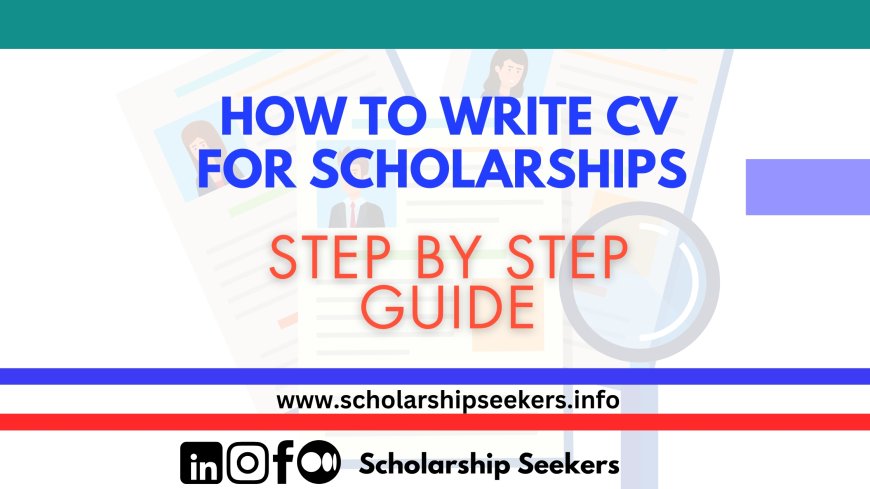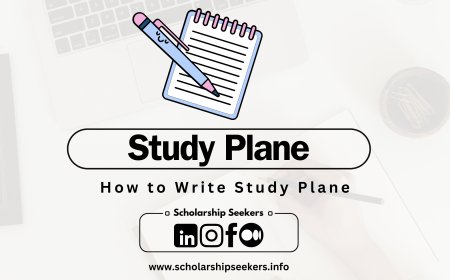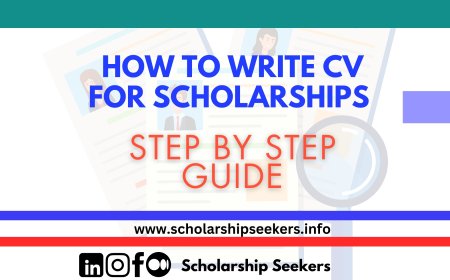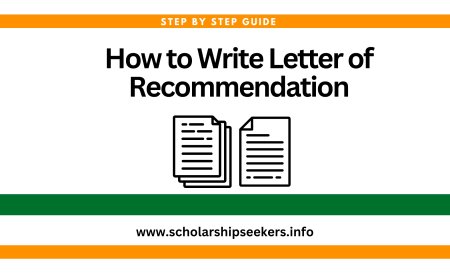How to Write CV for Scholarships and University Admissions
This article provides a comprehensive guide on writing an academic CV tailored for scholarships, internships, and university admissions. It covers essential sections such as personal details, education, work experience, skills, awards, research experience, and extracurricular activities. Additionally, it offers tips for presenting information effectively and avoiding common mistakes.

What is CV?
The CV, also known as a resume, is probably the most important document that provides an employer, provides a university, an admissions tutor, with the information about you contained. So that could be your academics that includes your experience that includes your skill set and your interests. So that's why it's really important that you take particular care into perfecting and getting that CV right, just as if you would for a personal statement.
I will tell you that since when you have to start emailing your professors for acceptance letter if you want to apply for CSE, Ansu scholarship or any other Chinese scholarship. Apart from that, I will tell you that how you have to make your CV because CV is one of the most important thing for getting acceptance letter. As you all know that acceptance letter is not a compulsory thing especially for CSE scholarship.
I'm specifically speaking about a CV for university that means a CV for either a PhD, for a master's, for an internship.
Step by step guide
- Always write your full name and address on your CV.
- Create a CV that is easy to read and contains all necessary information.
- Avoid including irrelevant information like gender, unless requested by the scholarship committee, professor, or if you're applying from a country where gender cannot be inferred from your name. In such cases, follow Sigar Supko's guidance.
- Limit the inclusion of an image in your CV to when it's absolutely necessary.
- Only list relevant skills and certifications acquired through professional training. If you don't have experience or certifications in a particular area, such as event management, don't include it.
- Use clear and concise language. Avoid using complex words that may appear unprofessional. Remember, professors often form an initial impression within seconds.
- Begin with your most recent education and work experience.
- Be honest and accurate in your CV. Pay close attention to grammar and spelling. Use online tools to check your work.
- Avoid including references unless they are specifically requested.
- Refrain from discussing your personal likes, dislikes, or interests. The focus should be on your professional qualifications.
- Tailor your CV to the specific requirements of each scholarship or university. Highlight information most relevant to the application. For example, after gaining professional experience, you may no longer need to emphasize your matriculation or intermediate results.
- Keep your CV concise. One page is ideal, but two pages are acceptable if necessary. This is especially true for research-based positions.
- Ensure that the information in your CV is directly relevant to the position you're applying for.
- Always send CVs and cover letters as PDF files to maintain formatting and layout.
- Incorporate keywords related to your industry and field. Many software programs use keyword searches to screen CVs.
Note: Professionalism is crucial for success. Pay attention to detail and avoid taking shortcuts. A well-crafted CV can significantly impact your chances of securing a scholarship or research position.

Start from top
So right at the top of your CV, you want to include your personal details, that includes your name, that includes your location, and even now that would include a LinkedIn possibly, or even a website where you might have a blog, you know, a blog that kind of encompasses all your academic work, or even a research page if you have sort of research gates, or any sort of Google Scholar page, a page where, an online page where you might have all your work displayed, any research papers that you are part of, things like that, any sort of detail, contact number, emails, that should all be right at the top where you can see it first. So for the content, you want to start off with your academics.
Work experience
If you have work experience, then it is well and good. If not, then it is not a compulsory thing for scholarship. So, whatever latest thing you have, if you don't have work experience, then you will start with your education. Now, I have work experience. So, first of all, I wrote my work experience in which I worked as an economic writer with Independent News. After that, I worked as a volunteer with an NGO.
Education
I have written about my education. Whatever is your latest education in education, you will write that. If you have done MPhil, then you will write your MPhil first. After that, you will write about your Bachelors. But if you have done just Bachelors, then you will write about your Bachelors and also write about your Inter. There is no need to write about Matric. And if you are writing about MPhil, then explain about your research in 2-3 lines, as I have also explained. So,
If you have done Bachelors recently and you want to apply for Masters or Scholarship, then you can write about any report or project you have done during Bachelors. Next, these are my research publications. It is not compulsory to have a publication for Scholarship. But this is a big plus point for you. If you have written any paper, research paper or any news article or any report or published anywhere, then you should definitely add it.
Courses and language skills
After that, there is Language Skills. After Language Skills, there are Online Courses. Online Courses are very important.
You can do online free of cost with Certificates. You can just search on Google. I will also put the link of Asian Development Bank in the description of this video, from where you can do free online courses with Certificates. See, everyone has degrees. But these extracurricular activities, social activities or online courses make you unique. So, if you have Certificates, then you should definitely add it in your CV.
Because of this, your CV will be stronger and you will have more chances to secure Scholarships. After that, there is Training and Workshop. If you have attended any training or workshop, then you can add it in this.
Conferences and Seminars
There are Conferences and Seminars. If you have attended any conference or seminar, then you can add it in your CV.
Digital Skills
In Digital Skills, there are Computer Skills, Research Skills and Communication Skills. I have written it according to my field. You can write it according to your field.
Like, in my field, python language, C++, and matplotlab, data visualization are mostly use in data science and machine learning. In this way, you can write whatever software is used in your field according to your field.
Awards
The next thing on my CV would be scholarships and awards, so anything that I have been awarded related to, again related to science, related to your research, in this case for me, would be any scholarships or awards. So for example, during my undergrad I got a scholarship to be in a lab for six months during the summer that would be listed there. I got a scholarship for my master's, that would be listed there, and just the details of you know who awarded it, what the you know what the dates were, and even maybe the amount that you were awarded, not necessary, but you could include all that information if you wanted to, but again it just shows that you're able to win awards, and someone that the research world really wants.
Research experience & technical experience
Then moving on, you want to include your research experience and or your technical experience, so again depends on sort of what your experiences are, but your research experience would be things like you know actually when you were in the lab, what did you do, what skill sets do you have, can you do PCR, can you do western blots, what can you actually do, and then more technical skills, if you're good at maybe MATLAB, coding, data science, whatever, anything technical that you can throw into there would be also really useful, and just kind of giving you know maybe mentioning one line as to what skill is, and then having a sort of a brief summary, just no more than two lines to a bit more detail, so what is it that you're actually involved in, what is it that you can say that you feel you know you've got some sort of skills, some sort of competency in.
Extracurricular activities
And then last but not least, extracurricular activities, this is a really important section because this shows you know a bit more of your personality, so far we've been quite academic heavy, which is you know I think more than more than you know correct for a CV for grad school or an academic CV, but when you get to that end you know you want to see some personality, so what are some things that you do, try to make it relatable, try to make it something where you maybe have a position of responsibility, if you're the head of a society, or if you have a blog, or if you have something online, a business, and just something that shows that you're kind of keeping up with something else at the same time, and you're able to juggle sort of multiple demands.
Recommendation Letters or references
And this is the last recommendation or reference in which I have written the names of my professors.
This is not compulsory, but it is okay if you write. Even if you don't write, it is still okay. So, this was today's video.
Related links:
Files
What's Your Reaction?





































